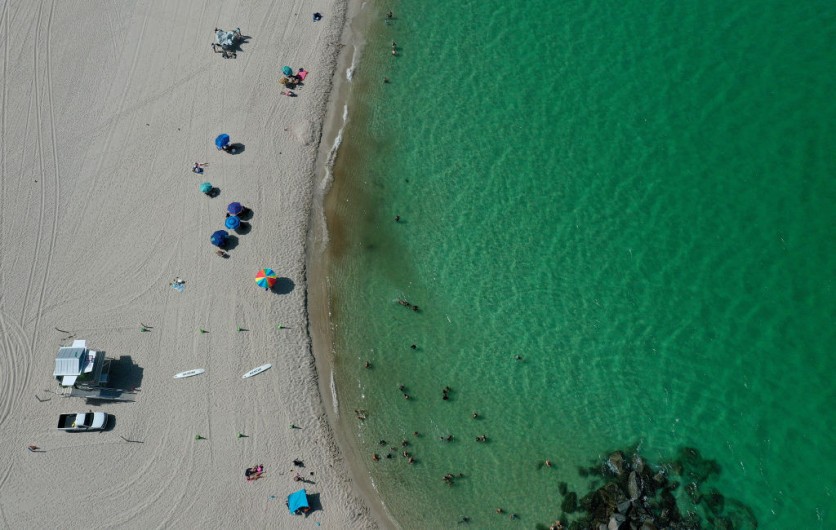Climate change is setting extreme temperature records globally this month, posing a threat to delicate marine ecosystems in the region. Florida's water temperature at the tip reached over 100 degrees Fahrenheit for two days, potentially resulting in coral bleaching and fatalities.

Florida's World Record for Warmest Seawater
The tip of Florida experienced an unprecedented surge in water temperature, reaching over 100 degrees Fahrenheit for two consecutive days. Meteorologists suggest this could potentially be the highest seawater temperature ever recorded, although there are concerns about the accuracy of the reading.
ABC News reported that scientists observed devastating consequences due to prolonged hot water surrounding Florida, leading to severe coral bleaching and even fatalities in Manatee Bay, about 40 miles south of Miami.
From 5 p.m. until late evening Monday, temperatures stayed at or above 100 degrees. While weather records for seawater temperature remain unofficial, meteorologists have highlighted certain conditions that might disqualify the recent reading for a top mark.
The initial buoy reading at Manatee Bay reached 101.1 degrees Fahrenheit on Monday evening. The same buoy recorded a temperature of 100.2 degrees Fahrenheit on Sunday night.
"It seems plausible... That is a potential record," said National Weather Service meteorologist George Rizzuto.
Rizzuto noted that a new record from Florida is plausible since nearby buoys ranged between 98 and 99 degrees Fahrenheit. Climate change continues to set temperature records worldwide throughout this month, raising alarm for the region's delicate marine ecosystems.
Washington Post reported that South Florida's scorching waters are only part of a broader marine heat wave affecting various regions in the Northern Hemisphere.
Other hot spots include the Mediterranean Sea, which recently reached a record-high temperature of 83.1 degrees Fahrenheit. Additionally, the waters in the west of Peru and the North Atlantic Ocean are also experiencing extraordinary temperature increases, contributing to the ongoing heat wave.
Coral Bleaching, Fatalities
Although there are not many coral reefs in Manatee Bay, Associated Press reported that scientists diving at another location in the Florida Keys called Cheeca Rocks observed the devastating effects of bleaching and coral death in some of the region's most resilient corals.
Observers include Ian Enochs, head of the coral program at the National Oceanic and Atmospheric Administration (NOAA) Atlantic Oceanographic and Meteorological Laboratory.
On the other hand, NOAA researcher Andrew Ibarra, who ventured to the area in a kayak due to the hot water, discovered an alarming sight of the entire reef exhibiting some level of bleaching, partial or full-out.
In addition to bleaching observed by the University of Miami last week, some corals have also died, further raising concerns for the fragile marine ecosystem. It comes as NOAA heightened the level alert for coral issues earlier this month.
According to NOAA, sea surface temperatures have been setting monthly heat records globally, with notable spikes in April, May, and June. Particularly in the North Atlantic, temperatures have soared significantly, reaching 9 to 11 degrees Fahrenheit above average in certain areas near Newfoundland.
Related Article : Scientists Provide First Comprehensive View of Oxygen Loss on Coral Reefs Due to Ocean Warming

ⓒ 2026 TECHTIMES.com All rights reserved. Do not reproduce without permission.




